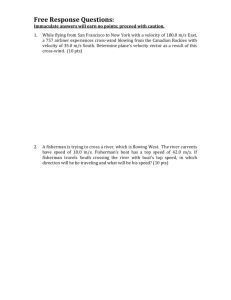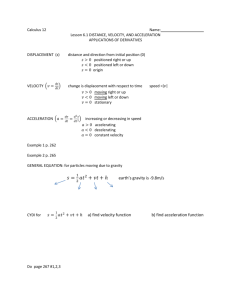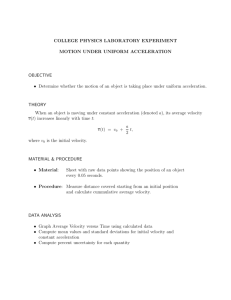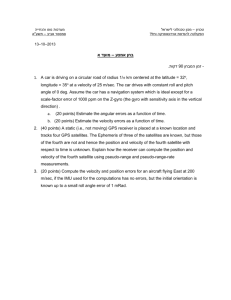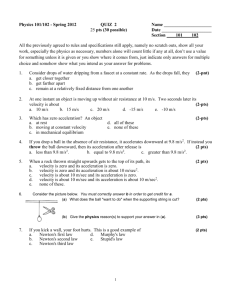Moving Man Lab Homework
advertisement
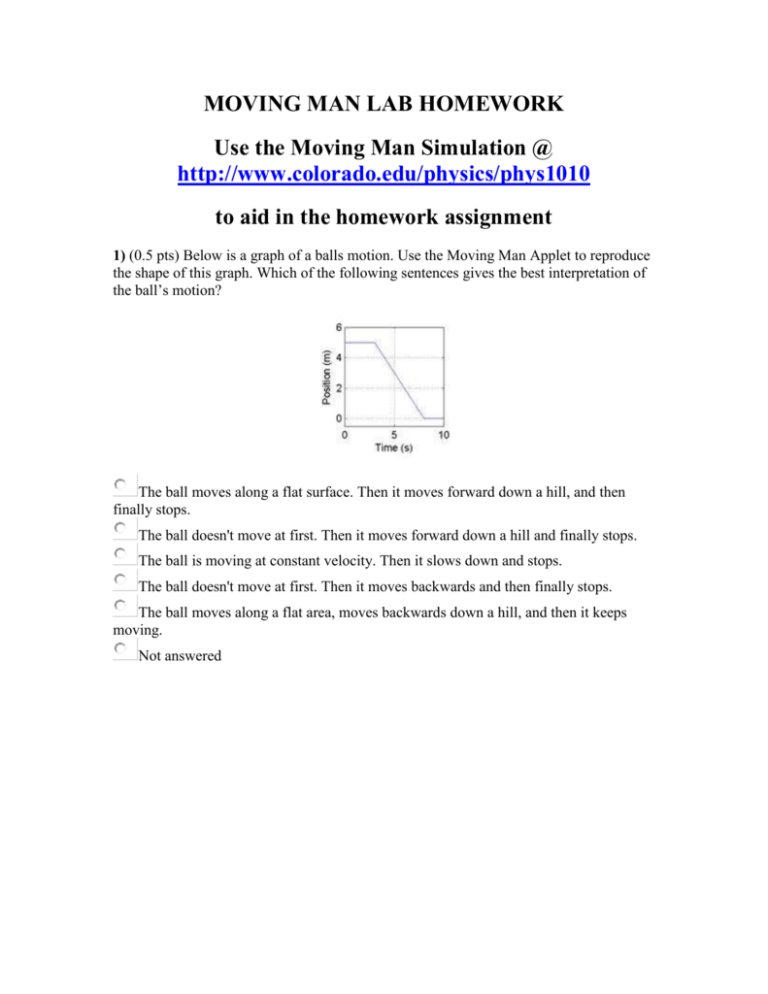
MOVING MAN LAB HOMEWORK Use the Moving Man Simulation @ http://www.colorado.edu/physics/phys1010 to aid in the homework assignment 1) (0.5 pts) Below is a graph of a balls motion. Use the Moving Man Applet to reproduce the shape of this graph. Which of the following sentences gives the best interpretation of the ball’s motion? The ball moves along a flat surface. Then it moves forward down a hill, and then finally stops. The ball doesn't move at first. Then it moves forward down a hill and finally stops. The ball is moving at constant velocity. Then it slows down and stops. The ball doesn't move at first. Then it moves backwards and then finally stops. The ball moves along a flat area, moves backwards down a hill, and then it keeps moving. Not answered 2) (0.5 pts) First, orient yourself to the Moving Man tool by selecting the “accelerate” motion from the choose motion list. With the moving man starting at a position of -8 m, set him to “accelerate” at 1 m/s2 from an initial velocity of 0. Observe the motion. Also notice that the tool comes equipped with a playback feature and a double-bar cursor that you may move with the mouse to probe position, velocity, and acceleration along the graph. What is his velocity when he crosses the origin (the position of 0 meters)? 3) (1 pt) In class, we looked at how human motions could be represented on position versus time and velocity versus time graphs by using a motion detector to collect data. Use Moving Man to simulate the following scenario: A man starts at the origin, walks towards the tree slowly and steadily for 6 seconds, then stands still for 6 seconds, and then turns around and walks towards the house steadily about twice as fast for 6 seconds. a) Which of the following velocity versus time graphs conveys this type of motion: b) Which of the following position versus time graphs also conveys this motion? 4) (4.5 pts total) A car is traveling along a road. Its velocity is recorded as a function of time and is shown in the graph below. Use the Moving Man Simulation to reproduce the shape of this graph. You’ll find that there are a variety of approaches for recreating this type of motion within the applet, these include among others: • reproducing the motion using the walk motion and the velocity slider control, • reproducing the motion using the accelerate motion and acceleration slider control, or • reproducing the motion using direct mouse control over the walking man. Note: This method is hard! a) (1 pt) Describe in your own words the motion of the car and give a everyday life scenario in which the car’s velocity would resemble the plot shown above. Explain your reasoning by relating your description to what you see in the graph of the velocity vs time. b) (0.5 pts) From this graph, what do you know about the position of the car at time equals 0 seconds? c) (0.5 pts) How far does the car travel between 0 and 3 seconds? d) (0.5 pts) The graph of the velocity of the car over this time period tells you how fast the car is going and what direction it is traveling at any time during this period. This information also tells you how the position of the car is changing during over that time period. Which of the following graphs of position versus time of the car is consistent with the velocity of the car as a function of time? e) (1 pt) During which of the following times is the car accelerating? (Check all that apply) between 0 and 3 seconds for only a brief instant at 3 seconds Answer: between 3 and 8 seconds between 8 and 13 seconds for only a brief instant at 13 seconds Answer: between 13 and 17 seconds for only a brief instant at 17 seconds between 17 and 20 seconds f) (1 pt) What is the.. i) average acceleration between 0 and 3 seconds ii) average acceleration between 3 and 8 seconds: 5) (2 pts) The moving man applet allows you to set him into “Walk” mode and control the velocity at which the man walks. Play around with this control until you gain an intuition as to how the motion of the moving man relates to the velocity setting. If the velocity is negative, the man is walking towards the tree under all conditions. True False Not answered If the velocity is positive, the man’s position is always greater than zero. True False Not answered If the velocity is negative, the acceleration is negative. True False Not answered A negative velocity means the man is slowing down. True False Not answered If the velocity is zero, the moving man is at the origin. True False Not answered 6) (3.5 pts total) Two cars (A and B) are moving along the same stretch of road. The figure below shows a position versus time graph for the motions of the cars. a) (0.5 pts) Which of the following pictures best represents a snapshot of the road way at t=0 sec. b) At the instant time=2sec, i) (0.25 pts) Car A is … Car B ahead of behind along side ..... Not answered ii) (0.25 pts) The speed of Car A is … Car B faster than slower than equal to ...... Not answered iii) (1 pt) Explain your reasoning for your answers to i and ii. c) (0.5 pts) At the instant t=6sec, i) Car A is … Car B ahead of behind along side ...... ii) The speed of Car A is … Car B faster than slower than equal to ...... Not answered Not answered d) (0.5 pts) Which of the following statements best describes the situation depicted in the position versus time graph? Car A speeds up and passes Car B, which is traveling at a constant speed. Car B slows down and is passed by Car A, which is traveling at a constant speed Car A, traveling at a constant speed, approaches and passes Car B, which is also traveling at a constant speed. Car A speeds up, Car B slows down, and Car A passes Car B. Not answered e) (0.5 pts) What is the velocity of Car B at t=2 seconds? 7) (3.4 pts total) The motion of a walking man is recorded on the position vs time graph below. Use the Moving Man Applet in the “Walk” mode to reproduce this position vs time graph by adjusting the velocity slider as the man is walking. a) (2.4 pts) At which of the lettered points on the graph: (Choose all that apply) i) is the man’s motion slowest? ii) is the man speeding up? iii) is the man slowing down iv) is the man turning around? a a b b a c b a c d c b d e d c e f e d f f e f b) (1 pt) Your friend is not taking physics, but wants to know how you can tell from just looking at this graph of position vs time when the man is slowing down and when he is speeding up. How would you explain it to him so that he could make sense of it (without using technical terms like slope)?
